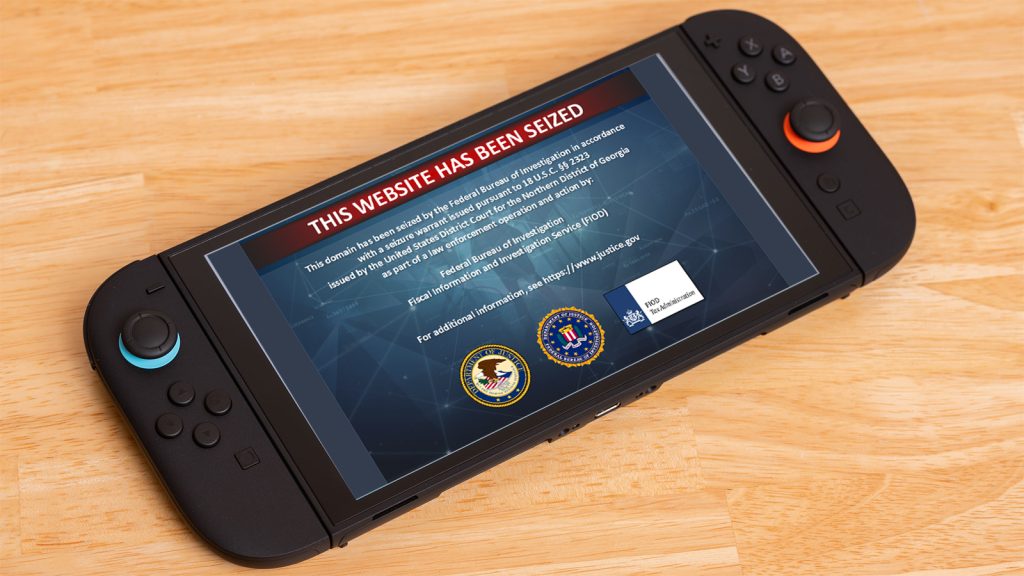In a significant crackdown on video game piracy, U.S. authorities have taken action against one of the largest websites dedicated to distributing pirated content for the Nintendo Switch. NWS2U.com, a notorious platform for downloading game ROMs without payment, has been seized, effectively disrupting the illegal distribution of Nintendo games. The homepage of NWS2U now displays a stern warning from the U.S. Department of Justice, the Federal Bureau of Investigation (FBI), and the Dutch Fiscal Information and Investigation Service (FIOD), indicating that the site has been shut down due to legal violations under U.S. law.
The Federal Crackdown on Piracy
The seizure indicates a concerted effort by law enforcement to combat piracy in the gaming industry. The FBI’s announcement specifies that NWS2U was taken offline under a seizure warrant based on 18 U.S.C. § 2323, which pertains to intellectual property rights violations. This action is part of a broader initiative to protect creators and developers from theft and unauthorized distribution of their work. The impact of this shutdown is profound; not only does it curb easy access to pirated games for those using jailbroken Nintendo Switch consoles or emulators, it sends a clear message about the seriousness of copyright infringement in the digital age.
Nintendo has a long history of defending its intellectual properties vigorously. The company has previously taken stringent measures against users violating its terms of service. Recently, they made headlines after banning users of the Mig Flash cartridge, a device that allegedly allowed players to run their own ROMs on the newer Switch models. This response underscores the company’s commitment to safeguarding its titles, even when the accused users claim they were merely utilizing their legitimate owned games.
The Switch 2 and Market Dynamics
With the recent release of the Nintendo Switch 2, which has reportedly sold 3.5 million units during its opening weekend, the stakes are higher for Nintendo regarding the protection of its intellectual property. The newly launched console has sold over a million more units in its first month compared to its predecessor, demonstrating a solid demand for Nintendo’s hardware and its exclusive titles. The increased popularity and sales of the Switch 2 amplify the company’s efforts to ensure that their games remain profitable and exclusive to legitimate buyers.
The competitive landscape of handheld gaming has intensified, especially with other players like the Steam Deck and the ROG Ally X gaining traction in the market. The Switch 2, despite its success, faces challenges in raw processing power when compared to these x86-based competitors, indicating that Nintendo’s focus on exclusivity and titles might be crucial for its continued success. Banning piracy not only protects its revenue but also reinforces the value of having exclusive content that draws players to its platform.
Community Reactions
The shutdown of NWS2U.com has elicited a mixed response from the gaming community. While many players express support for Nintendo’s anti-piracy measures, arguing that they help maintain a fair market for developers and gamers who pay for their games, others criticize the actions as overly aggressive. The notion of personal ownership over games purchased raises ethical questions around digital rights and fair use. Some argue that players should have the ability to use ROMs of games they own legally, especially for preservation purposes and backward compatibility.
In light of the seizure, discussions have emerged around the future of emulation and the legalities surrounding it. Emulation, when used to play games owned by users, often exists in a legal gray area that is vigorously contested. Legal challenges to Nintendo’s practices have already arisen, such as in Brazil, where the government is examining potential abuses in Nintendo’s end-user license agreements. This scrutiny could pave the way for more discussions on digital ownership rights and how they align with current laws.
Looking Ahead
The increasing enforcement of anti-piracy regulations sets a precedent for the future of gaming and digital content. As the industry evolves with advancements in technology, it will be essential for laws to adapt to the changing landscape. The seizure of NWS2U.com reflects a growing determination to protect intellectual property in the gaming sector, but it also illustrates the ongoing struggles between companies and the gaming community over how best to address piracy, ownership, and access to games.
As the conversation around these issues continues, it will be interesting to see how Nintendo, along with other gaming companies, navigates the challenges of protecting their intellectual property without alienating their player base. The balance between enforcement and access may well define the gaming industry in the years to come.

